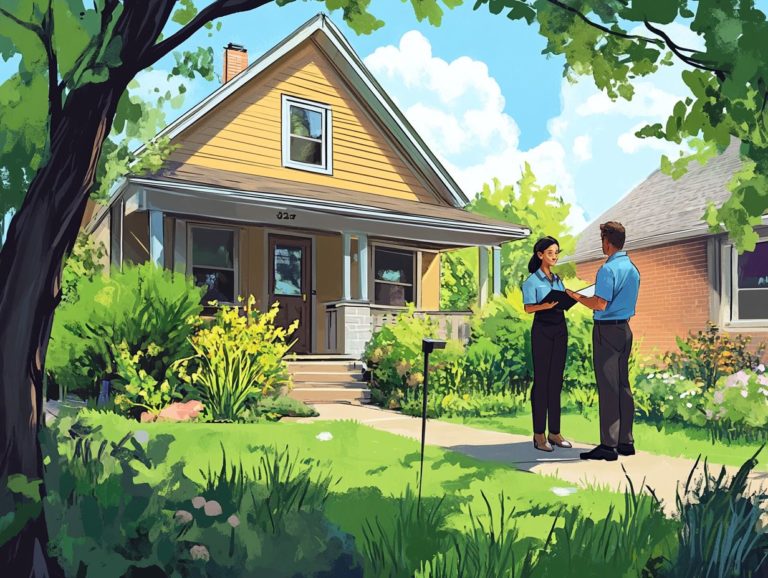5 Ways to Protect Your Home from Water Damage
Water damage can wreak havoc on your home, resulting in costly repairs and lasting issues.
To safeguard your property and keep it dry, consider these five essential strategies. From maintaining your gutters to inspecting your roof, there are practical steps you can take.
Be vigilant about recognizing the signs of water damage, understanding common causes, and knowing what to do if a problem arises. Your journey to protecting your home begins here!
Contents
- Key Takeaways:
- 1. Check and Maintain Gutters and Downspouts
- 2. Inspect and Repair Roof Leaks
- 3. Properly Landscape Your Yard
- 4. Install a Sump Pump
- 5. Regularly Check for Plumbing Leaks
- How Can Water Damage Affect Your Home?
- Frequently Asked Questions
- What are the five ways to protect my home from water damage?
- How often should I inspect my roof to prevent water damage?
- Why is it important to maintain my gutters and downspouts?
- How can sealing cracks and openings help protect my home from water damage?
- I’ve noticed my water bill has been higher than usual. Should I be concerned about water damage?
- What is a sump pump and how can it protect my home from water damage?
Key Takeaways:
- Regularly maintain gutters and downspouts to prevent water from seeping into your home.
- Don’t overlook roof leaks; inspect and repair them promptly.
- Properly landscape your yard to redirect water away from your foundation.
- Consider installing a sump pump to protect your basement.
1. Check and Maintain Gutters and Downspouts
Checking and maintaining your gutters and downspouts is crucial for preventing water damage. Ensure rainwater is effectively directed away from your home to protect its foundation from flooding and moisture entering your home.
Regularly clean your gutters to avoid clogs that can obstruct water flow. Overflowing water can lead to serious structural issues.
Install gutter guards to reduce how often you need to clean them, making maintenance easier.
A well-functioning drainage system channels rainwater away from your home’s foundation, reducing the risk of basement seepage that can lead to mold growth and costly repairs. Act now to protect your home!
2. Inspect and Repair Roof Leaks
Inspecting and repairing roof leaks promptly is essential to prevent water damage. Minor leaks can lead to major moisture accumulation, threatening your home’s structure.
Utilize techniques like thermal imaging and smoke tests to identify leaks without causing damage.
Pay attention to caulking and sealing vulnerable areas around chimneys, vents, and flashings, as these are common entry points for water.
Regular roof inspections help you find and fix problems early, ensuring your roofing system remains intact. By staying vigilant, you can extend your roof’s lifespan and protect your property from unexpected water damage.
3. Properly Landscape Your Yard
Landscaping around your home can significantly reduce the risk of water damage. Directing rainfall away from your foundation enhances the efficiency of your drainage systems and prevents moisture from getting in.
Grade the land to create a slope away from your home, which helps manage water runoff and minimizes pooling.
Consider installing rain gardens with native plants to absorb excess rainwater. Choosing plants that thrive in wet conditions keeps your landscape vibrant while supporting natural drainage.
These efforts protect your property and enhance its aesthetic appeal, creating a balance between beauty and functionality.
4. Install a Sump Pump
Installing a sump pump is a smart move to protect your basement from water damage. This efficient device removes excess water and helps prevent flooding, safeguarding your belongings.
Sump pumps channel water away through a network of pipes, keeping your property protected even during heavy rains or rapid snowmelt.
Choose between various types, like submersible and pedestal sump pumps, each offering unique benefits.
Having a sump pump can enhance your homeowner’s insurance options; insurers appreciate the preventative measures these systems provide, making it easier to secure coverage against floods.
5. Regularly Check for Plumbing Leaks
Regularly checking for plumbing leaks is crucial for preventing water damage. Undetected leaks can lead to extensive damage to your property and result in costly repairs.
Being proactive can truly make a significant difference. Monitor your monthly water bills for any unusual spikes that could signal a hidden leak.
Routinely inspect appliances like dishwashers and washing machines, as these areas are common culprits for leaks. Check valves and connections for signs of moisture or corrosion to catch potential issues before they escalate.
Embrace these easy steps today to protect your home and enjoy peace of mind!
How Can Water Damage Affect Your Home?
Water damage can significantly impact your home, leading to structural concerns and the proliferation of mold an unwelcome guest that poses health risks and can diminish your property’s value.
This issue can present itself in various ways. For instance, you may experience basement seepage during heavy rains, with groundwater slowly infiltrating cracks and weak spots.
Appliance failures, such as leaking washing machines or water heaters, can create stagnant water that fosters mold growth. Sewer backups are another critical source of water damage, causing extensive harm while raising serious health concerns.
Address these problems quickly to protect both your home and your well-being. Don t wait!
What Are the Most Common Causes of Water Damage in Homes?
The most common culprits of water damage in homes include:
- Malfunctioning plumbing systems
- Roof leaks
- Basement seepage
- Heavy rainfall
Understanding these risks is crucial. Protect your property with flood insurance to avoid significant structural damage and costly repairs.
Don t wait! Inspect your pipes and roof today to prevent future disasters!
Flood insurance is essential for financial protection, covering repairs and replacement costs from unexpected water-related damages.
Spot the Warning Signs of Water Damage NOW!
Identifying signs of water damage early can save you from extensive repairs. Key indicators to watch for include:
- Water stains
- Damp spots
- Musty odors
- Visible mold growth
These signs can appear on ceilings, where leaks can leave discoloration or cause paint to peel. Keep an eye on walls for bubbling wallpaper or paint, clear indicators of potential moisture intrusion.
Basements may harbor odors hinting at hidden mold growth behind surfaces. Address these indicators promptly, as delaying corrective measures can lead to severe structural damage and health concerns.
Start your home inspection today to avoid costly repairs tomorrow!
How Can You Prevent Water Damage in Your Home?
Preventing water damage requires a blend of proactive maintenance and thoughtful strategies. Here are some essential steps:
- Regular inspections of plumbing systems
- Install waterproof bins
- Ensure proper landscape grading
Check pipes for signs of leaks or corrosion, as these issues can escalate into significant problems. Consider installing sump pumps, which help keep your basement dry during heavy rains.
Seal gaps around windows and doors with caulking to reduce water intrusion risk. Establish regular maintenance schedules with seasonal inspections and timely repairs to safeguard your home from potential water-related damage.
What Should You Do If You Discover Water Damage in Your Home?
If you discover water damage in your home, it s crucial to act swiftly. Start by assessing the extent of the damage and notifying your insurance provider.
Engage professionals for repairs and restoration to prevent further deterioration. Begin by documenting the affected areas with clear photographs and detailed notes. This evidence will bolster your insurance claim.
Next, prioritize drying out the impacted spaces to stop mold from growing and to prevent further structural damage. Use fans and dehumidifiers to your advantage. It s essential to monitor humidity levels and ensure proper ventilation.
Replacing damaged flooring or drywall promptly can also help preserve the integrity of your home. If the damage is extensive or if mold starts to appear, don t hesitate to call in certified professionals who specialize in water damage restoration and remediation. They possess the expertise and equipment needed to tackle the situation effectively.
How Can You Protect Your Home from Future Water Damage?
Protecting your home from future water damage requires maintenance practices, flood insurance, and strengthening your property’s defenses against water intrusion.
By incorporating regular inspections of crucial systems like roofing, plumbing, and drainage, you can spot potential issues before they spiral out of control. These proactive measures uphold the structural integrity of your property and provide the peace of mind that comes from knowing your defenses are solid.
Investing in flood insurance is just as vital; it can save you from unexpected expenses in the face of adverse weather. Ultimately, these strategies work together to enhance your home’s long-term resilience against the damaging effects of water.
Frequently Asked Questions
What are the five ways to protect my home from water damage?
The five ways to protect your home from water damage are inspecting your roof regularly, maintaining your gutters and downspouts, sealing cracks and openings, monitoring your water bill, and saving on home insurance premiums by implementing preventive measures.
How often should I inspect my roof to prevent water damage?
It is recommended to inspect your roof at least twice a year, once in the spring and once in the fall. Check your roof after severe weather events, such as heavy rain or hail.
Why is it important to maintain my gutters and downspouts?
Gutters and downspouts play a crucial role in directing water away from your home. If they are clogged or damaged, water can overflow and seep into your home, causing damage.
Regular maintenance, such as removing debris and checking for leaks, can prevent this from happening.
How can sealing cracks and openings help protect my home from water damage?
Cracks and openings in your home’s exterior provide an easy entry point for water. By sealing these areas with caulk or weather stripping, you can stop water from seeping into your home and causing damage.
It is important to regularly check and seal any openings, especially around windows and doors.
I’ve noticed my water bill has been higher than usual. Should I be concerned about water damage?
An unexpectedly high water bill could be a sign of a water leak in your home. If left unchecked, this can lead to water damage.
Monitor your water bill and address any sudden increases promptly to prevent potential damage and costly repairs.
What is a sump pump and how can it protect my home from water damage?
A sump pump is a device that helps remove excess water from your basement or crawl space. By automatically pumping out any water that accumulates, it can prevent flooding and water damage in these areas of your home.
It is essential to have a functioning sump pump, especially in areas prone to heavy rainfall or flooding.




